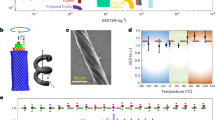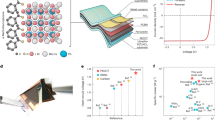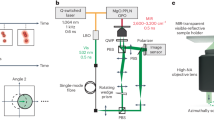Abstract
THE use of photo-electric cells in radiation pyrometry has been confined to direct measurement of the cell output in terms of temperature. This limits the accuracy of the method or necessitates the use of only the most stable cells, such as the vacuum emission cell. If, however, we apply the null method which has sometimes been employed in photometric uses of photo-electric cells, where the radiation from the unknown source is compared with that from a standard source by a sufficiently rapid alternative exposure of the cell to the two sources, the stability of the cell is no longer so important. Under these conditions of use, the less-stable cells, such as the gas-filled emission cell and the photoconductive lead sulphide cell, can be used for precise measurement.
This is a preview of subscription content, access via your institution
Access options
Subscribe to this journal
Receive 51 print issues and online access
$199.00 per year
only $3.90 per issue
Buy this article
- Purchase on Springer Link
- Instant access to full article PDF
Prices may be subject to local taxes which are calculated during checkout
Similar content being viewed by others
Author information
Authors and Affiliations
Rights and permissions
About this article
Cite this article
BARBER, C., PYATT, E. Low-Temperature Radiation Pyrometry using a Lead Sulphide Photoconductive Cell. Nature 165, 691–692 (1950). https://doi.org/10.1038/165691a0
Issue Date:
DOI: https://doi.org/10.1038/165691a0
This article is cited by
-
Measuring 400?900�C temperatures on a high-precision visual optical-pyrometer model
Measurement Techniques (1976)
Comments
By submitting a comment you agree to abide by our Terms and Community Guidelines. If you find something abusive or that does not comply with our terms or guidelines please flag it as inappropriate.



